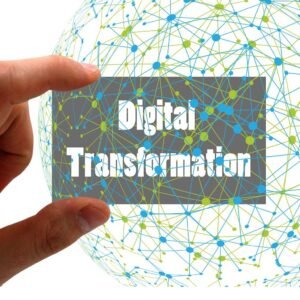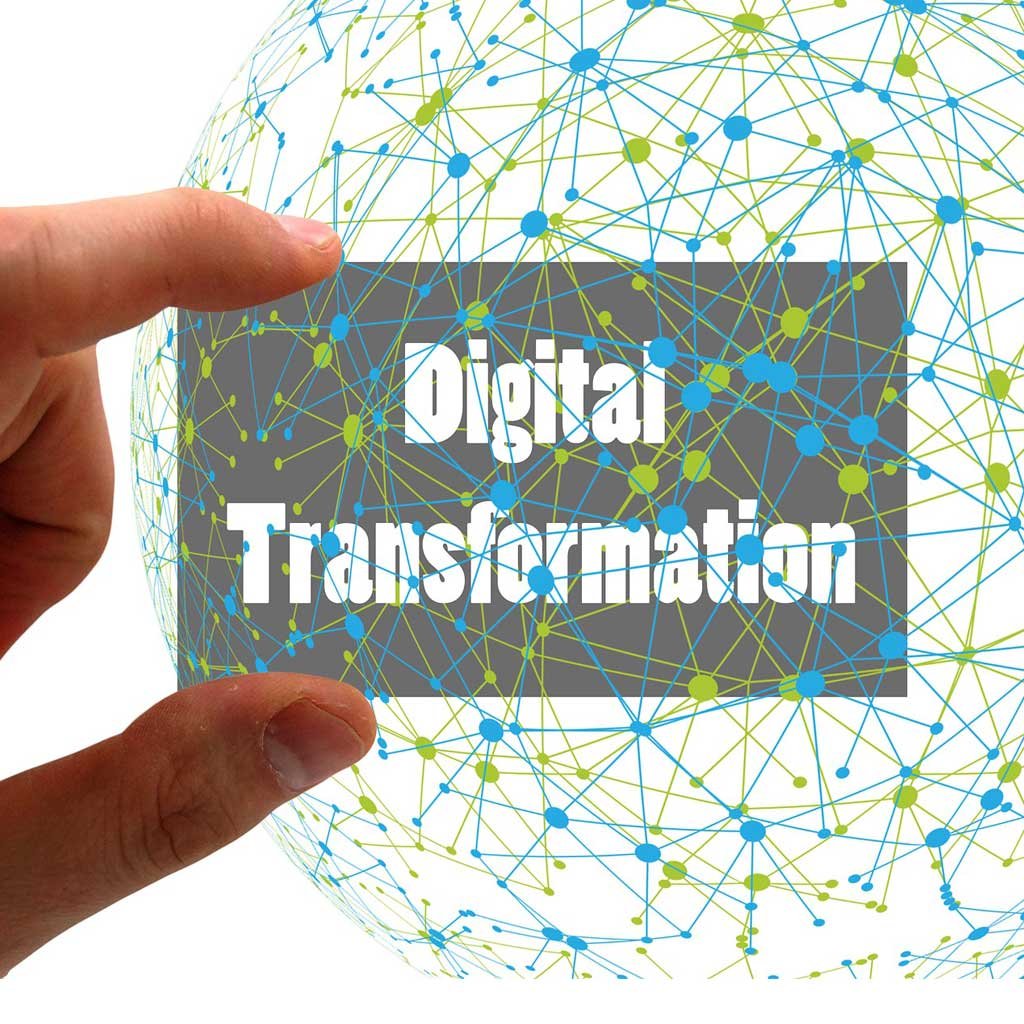Digital Transformation Enhances Sustainability and Environmental Responsibility

Digital transformation is revolutionizing industries by integrating digital technologies into all aspects of business operations. This transformation not only drives innovation and improves efficiency but also plays a crucial role in enhancing sustainability and environmental responsibility. By leveraging digital tools, organizations can minimize their environmental footprint, optimize resource usage, and promote eco-friendly practices. This comprehensive article explores how digital transformation can enhance sustainability and environmental responsibility across various sectors.
1. Introduction to Digital Transformation and Sustainability
1.1 Understanding Digital Transformation
Digital transformation involves the adoption of digital technologies to fundamentally change how businesses operate and deliver value to customers. This transformation encompasses various technologies, including artificial intelligence (AI), the Internet of Things (IoT), blockchain, big data, and cloud computing. These technologies enable organizations to streamline processes, improve decision-making, and foster innovation.
1.2 Defining Sustainability and Environmental Responsibility
Sustainability refers to meeting the needs of the present without compromising the ability of future generations to meet their own needs. Environmental responsibility involves practices and policies that aim to reduce negative impacts on the environment. Together, these concepts emphasize the importance of conserving natural resources, reducing pollution, and promoting ecological balance.
2. The Role of Digital Transformation in Enhancing Sustainability
Digital transformation can significantly contribute to sustainability in several ways:
2.1 Optimizing Resource Management
One of the key benefits of digital transformation is the ability to optimize resource management. Technologies like IoT and big data analytics enable organizations to monitor and manage resources more efficiently. For example, smart sensors can track energy usage in real-time, allowing businesses to identify and eliminate wasteful practices. Similarly, advanced analytics can optimize water usage in agriculture, ensuring that crops receive the right amount of water at the right time.
2.2 Reducing Carbon Footprint
Digital technologies can help reduce the carbon footprint of businesses. Cloud computing, for instance, allows companies to reduce their reliance on physical servers, leading to lower energy consumption and reduced greenhouse gas emissions. Moreover, AI and machine learning can optimize logistics and supply chain operations, reducing the need for transportation and thereby lowering emissions.
2.3 Promoting Renewable Energy
Digital transformation supports the adoption and integration of renewable energy sources. Smart grids, powered by IoT and AI, enable efficient distribution and management of renewable energy. These grids can balance supply and demand, store excess energy, and integrate various renewable sources, such as solar and wind power. This not only ensures a stable energy supply but also reduces dependence on fossil fuels.
3. Industry-Specific Applications of Digital Transformation for Sustainability
Digital transformation can drive sustainability in various industries, each with unique applications and benefits:
3.1 Manufacturing
In the manufacturing sector, digital transformation can lead to significant sustainability gains:
- Smart Manufacturing: IoT devices and sensors can monitor equipment and processes in real time, reducing energy consumption and minimizing waste.
- Predictive Maintenance: AI-driven predictive maintenance can prevent equipment failures, reducing downtime and resource waste.
- Sustainable Supply Chains: Blockchain technology can enhance supply chain transparency, ensuring that materials are sourced sustainably and ethically.
3.2 Agriculture
Agriculture can benefit from digital transformation through:
- Precision Farming: IoT devices and drones can monitor soil conditions, crop health, and weather patterns, optimizing resource usage and reducing chemical inputs.
- Smart Irrigation: AI-powered irrigation systems can ensure efficient water usage, minimizing waste and promoting sustainable farming practices.
- Supply Chain Transparency: Blockchain can track the journey of agricultural products from farm to table, ensuring sustainable and ethical practices.
3.3 Energy
The energy sector can leverage digital transformation for:
- Smart Grids: IoT and AI can optimize energy distribution, integrate renewable sources, and manage demand, reducing reliance on fossil fuels.
- Energy Storage: Advanced analytics can improve energy storage systems, ensuring a stable supply of renewable energy.
- Energy Efficiency: Smart meters and sensors can monitor energy usage in real time, identifying opportunities for efficiency improvements.
3.4 Transportation
In the transportation sector, digital transformation can enhance sustainability through:
- Electric Vehicles (EVs): IoT and AI can optimize EV charging infrastructure, promoting the adoption of electric vehicles and reducing emissions.
- Smart Traffic Management: AI-powered traffic management systems can reduce congestion and optimize routes, lowering fuel consumption and emissions.
- Shared Mobility: Digital platforms can facilitate carpooling and ride-sharing, reducing the number of vehicles on the road and minimizing emissions.
3.5 Construction
The construction industry can benefit from digital transformation by:
- Building Information Modeling (BIM): BIM can optimize construction processes, reducing material waste and improving energy efficiency.
- Smart Buildings: IoT devices can monitor and control building systems, optimizing energy usage and promoting sustainable building practices.
- Sustainable Materials: Blockchain can ensure the use of sustainable and ethically sourced materials in construction projects.
4. Case Studies of Digital Transformation for Sustainability
Examining real-world examples can provide insights into how digital transformation enhances sustainability:
4.1 Siemens Smart Grid Solutions
Siemens has developed smart grid solutions that integrate renewable energy sources and optimize energy distribution. By using IoT sensors and AI algorithms, Siemens can balance supply and demand, store excess energy, and reduce reliance on fossil fuels. This has led to more sustainable energy management and reduced carbon emissions.
4.2 John Deere Precision Agriculture
John Deere, a leader in agricultural machinery, has embraced precision agriculture through IoT and AI technologies. Their equipment uses sensors and GPS technology to monitor soil conditions and crop health, optimizing resource usage and reducing chemical inputs. This has resulted in more sustainable farming practices and improved crop yields.
4.3 Tesla Electric Vehicles and Energy Solutions
Tesla is at the forefront of digital transformation in the transportation and energy sectors. Their electric vehicles (EVs) use advanced software to optimize battery performance and charging infrastructure. Additionally, Tesla’s energy solutions, including solar panels and energy storage systems, promote the use of renewable energy and reduce carbon emissions.
4.4 Unilever’s Sustainable Supply Chain
Unilever has implemented blockchain technology to enhance supply chain transparency and ensure sustainable sourcing of raw materials. By tracking the journey of products from farm to consumer, Unilever can verify ethical practices and reduce environmental impacts. This has strengthened their commitment to sustainability and improved consumer trust.
5. Challenges and Considerations in Implementing Digital Transformation for Sustainability
While digital transformation offers significant sustainability benefits, there are challenges and considerations to address:
5.1 Initial Investment and Costs
Implementing digital transformation requires significant upfront investment in technology and infrastructure. Organizations must weigh the costs against the long-term sustainability benefits and potential cost savings.
5.2 Data Security and Privacy
Digital technologies generate vast amounts of data, raising concerns about data security and privacy. Organizations must implement robust security measures to protect sensitive information and ensure compliance with data protection regulations.
5.3 Integration and Interoperability
Integrating digital technologies into existing systems can be complex. Ensuring interoperability between different technologies and platforms is crucial for seamless operation and data exchange.
5.4 Skill and Talent Gaps
Digital transformation requires specialized skills and expertise. Organizations must invest in training and upskilling their workforce to effectively implement and manage digital technologies.
5.5 Environmental Impact of Technology
While digital technologies can enhance sustainability, they also have environmental impacts. The production and disposal of electronic devices, as well as the data center’s energy consumption, must be managed responsibly to minimize negative effects.
6. Future Trends in Digital Transformation and Sustainability
The future of digital transformation holds exciting possibilities for sustainability:
6.1 Artificial Intelligence and Machine Learning
AI and machine learning will continue to play a pivotal role in optimizing resource management, energy efficiency, and supply chain operations. Advanced algorithms will enable more accurate predictions and real-time decision-making.
6.2 Internet of Things (IoT)
The IoT will expand, connecting more devices and systems. This will enhance data collection and analysis, enabling more precise monitoring and management of resources.
6.3 Blockchain Technology
Blockchain will drive greater transparency and accountability in supply chains. It will enable organizations to verify sustainable practices and ensure ethical sourcing of materials.
6.4 5G Technology
The rollout of 5G networks will facilitate faster and more reliable communication between devices. This will enhance the capabilities of IoT systems and enable real-time data processing, further optimizing resource usage.
6.5 Renewable Energy Integration
Advances in renewable energy technologies and smart grids will accelerate the transition to sustainable energy sources. Improved energy storage solutions will ensure a stable supply of renewable energy.
6.6 Circular Economy Models
Digital transformation will support circular economy models, where products are designed for reuse, recycling, and minimal waste. Technologies like IoT and blockchain will enable efficient tracking and management of materials throughout their lifecycle.
Digital transformation is a powerful catalyst for enhancing sustainability and environmental responsibility. By leveraging digital technologies, organizations can optimize resource management, reduce their carbon footprint, and promote eco-friendly practices. The benefits of digital transformation extend across various industries, from manufacturing and agriculture to energy and transportation.
As we look to the future, the continued integration of AI, IoT, blockchain, and other digital technologies will drive further advancements in sustainability. Organizations must embrace digital transformation strategically, addressing challenges such as initial investment, data security, and skill gaps. By doing so, they can achieve significant environmental benefits and contribute to a more sustainable and responsible world.
In conclusion, digital transformation offers a transformative path towards a more sustainable future. By harnessing the power of digital technologies, businesses and societies can reduce environmental impact, optimize resource usage, and create a more sustainable and prosperous world for future generations.

